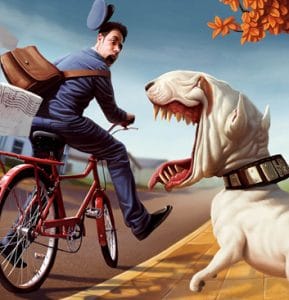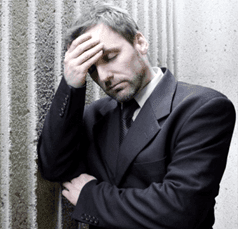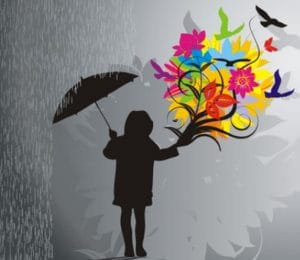Are you struggling with a disease … or are you taking it into account?

Early Saturday morning. You’re still in bed when you hear the doorbell. You are surprised at the door by the postman: “Good morning, it’s time to sign …”. Your mind races with thoughts of what is hidden in the ominous blue envelope.
You immediately open the envelope and see a notice from the bank – due to the difficult market conditions, you are informed that the guarantee for your loan is no longer valid. They kindly ask you to pay it off early or find a new form of collateral, or risk having your house repossessed.
In a burst of “interesting” thoughts and feelings, you call the postman to come back. When he reaches you, you wordlessly slap him hard.
Of course, this story is just an imaginary frame that could have been in a film or a comedy series. But it is not so innocent, or even theoretical, if we look at it as a metaphor.
In life, are we not inclined to kill the bad guy who brings us a bad message?
This is particularly evident in the area of health. Illness – or rather its symptoms – are the end state of something that has been knitting inside us for a long time. So we are talking about a consequence. And often an illness, especially a serious or chronic one, is also a messenger that brings us an important message.
But we very rarely see it as such. Usually, the fear of the unknown and the emotions of the moment cloud our judgement so much that we have only one goal in mind: to get rid as quickly as possible of the annoying intruder that has – most likely by accident or somehow “of its own accord” – got into our body. (Read: if anyone is to blame for this situation, it’s certainly not us.)
We see illness like a cockroach spotted by the dustbin. First, let’s take a little nap … maybe wonder how he got there … then turn around and continue on our way – hoping we never see this scum again. Or kill it.
The goal remains the same: we hope to have got rid not only of this animal, but also of all its “close relatives”.
In short, our wish is to return to our previous life as soon as possible, without any change. (If it were possible, we would also erase the memory of the unfriendly encounter.)
It is as if they want to deny what has just happened.
Sometimes we manage to get away with it. (Especially with minor “disturbances”.)
But sometimes it is still useful to stop for a moment and at least think about what is going on.What if we have just killed the bad guy who brought us the message?
Disease as a consequence, the body as a map
Physical symptoms are the physical revelation of something that is happening on an energetic, mental and emotional level. Just as we don’t perceive the influence of a magnet until we put a metal object next to it, we are often unaware of what we are doing to our own thinking and feeling – until it expresses itself on a physical or bodily level. (Note: destructive thinking does not necessarily have to express itself in the form of illness; it can also take the form of blockages in relationships, in money, in work… But let’s limit ourselves to illness this time.)
The fact is that thoughts and emotions affect the physical body. Everything we experience in our minds is transferred through chemical reactions to every cell in our body, which react accordingly.
Cells can be in two states: either in a state of renewal and growth, or in a state of alarm, where they literally close in on themselves and shut down important processes.
The cause of the first or second condition is precisely our view of ourselves, of others and of life. If we see the situation of life as friendly and encouraging, growth and renewal take place in the body. If we feel like a victim and see the world around us as a threat, growth and renewal stop.
The key element is therefore our perception, not the actual situation. (Which means that if we live in abundance and happiness but don’t notice it – because we are filled with worries and fears – we are no better off than someone who is actually living in very bad circumstances. But the reverse is also true.)

The mind’s task is to create coherence or harmony between the perception of the world and the body’s processes. What we perceive externally, we feel internally. What we feel is materialised by the body.
Although each cell has its own control system, in the end the mind’s instruction always prevails. So, if a cell sees that it is not in danger or that everything is going fine, but at the same time receives a signal from the mind that some danger is imminent – so the body detects any thought that harbours fear – the latter information weighs in.
Therefore, we can say that the body is a map that reveals our conscious and unconscious thoughts, beliefs and actions. Or it shows us what we do with our own awareness.
And when it comes to illness, we’re all over the map …
The teacher reveals and warns; it is up to us to decide how to receive the information.
If we can maintain our judgement and wisdom in the face of the shock of learning of a more serious diagnosis, we will not be neck-deep in researching (and eliminating) the symptoms, but will see them as an important revelation. As Thomas Keller, the great American expert on esotericism, said, “Every disease is like a neon sign saying: disconnect from the existing functioning and make a change!”
So the goal of any warning in the form of a disease is first and foremost – change. It is to have the courage to ask:
- What am I doing differently in practice than I feel I want to do?
- Where have I gone wrong? What am I fooling myself with?
- In which areas and in which situations is it more important for me to create an impression than to express my true nature?
- What (and to whom) am I not saying or expressing that I really feel – because I am afraid of what others will think of me?
- What do I want to do, but never get around to?
- What would I do if I knew I couldn’t fail?
- How would I behave and what would I do if the only criterion was to be 100% honest with myself?
- How would I live if I had a feeling of complete security … lots of money … a loving and happy family … warm, loyal and sincere friends … fame and recognition from the greatest experts in the field I want to work in and the people I value most?
- Which activities open my heart the most, make me feel the most alive and active, and make me feel like I am contributing the most?
- The answers will point us in the direction of where we have closed our hearts and where our potentials for a happy life lie.
Illness can only be the trigger to finally ask these questions and to steer our lives towards the answers.
Change is the vehicle for development

The one common point of all real healings – which always happen (also) on the energetic plane – is change.
Sometimes it’s just a matter of getting active. Many people live in spasms and hidden apathy, sadness, fear and anxiety. When they should be moving forward, they stop … because the very thought of the next action makes them feel frustrated. The next stage from these passive, unpleasant emotions is anger, which releases stuck energy.
If we do not take this step, we will never get out of the status quo. (Read: wecannot move from a state of victimhood to a state of peace. In between, we have to go through a phase in which we stand up for ourselves, unshackle ourselves from the energy-stealers, regain our strength and confidence, find our vision, and plough new ground.)
This path requires courage and taking responsibility for all that we have created. As long as we point the finger at others, we will not feel the need to change anything about ourselves.
But there is no other way.
Lothar Hirneise presented his findings on “Who survives cancer” at a lecture in 2001. The study was based on several hundred cancer patients whose disease had progressed to the last stage but who were then cured.
He systematically divided the factors associated with patients’ cure into three groups:
- Detoxification group: around 60% of people who recovered were actively detoxifying their bodies during the treatment phase.
- Group 2 – Change in dietary habits: about 80% of survivors changed their dietary habits.
- Group – energy effect or awareness: 100% of those cured changed their lifestyle habits.
Whether it is health or anything else, the path is always the same: when we get trapped in passivity, routines or even numbness, the first step should be to be active. (Activity does not mean mindlessness; we can also be deliberate and deliberate.)
Treatment as part of a much more important process

Basically, we have only two options: either we turn away from the symptoms and start actively creating something new … or we get entangled with the symptoms. In the latter case, the disease can easily become our everyday preoccupation and even identity. We describe ourselves through the illness and also direct most of our energy towards thinking and acting related to the condition.
This can quickly lead us into a trap from which there is no escape: when we give attention to illness, we give it power… but at the same time we allow it to distract us from everything else, or to isolate us in the game.
This trap is also very powerful because we are caught in a vicious circle: if we want change, we need some inspiration … an indication that we are on the right track … or maybe even a guarantee that change will come to fruition. And we can’t get that because we don’t allow ourselves to reach beyond the limits of what is.
So we are locked into our existing patterns, habits, emotions, thinking… and often symptoms of illness.
The more we see our life as a drama called “Me and my illness” – where we both play the (only) lead roles – the quicker we need to make a change.
The first step is to realise that there is another way , or something more. (The answers to the questions above can help with this.) Then we have to allow ourselves the possibility, or at least a little belief, that change can happen.
The more open we are to the new possibility, the more faith and trust we will gain. Trust brings inspiration, courage and strength. If we cannot find inspiration in our existing circumstances, we need to create such a strong vision of a new life that we will draw it from there.
Grateful for illness?
As we move in this direction, we will come to an incredible realisation: the disease was not an obstacle on the way, but an acceleration or an opportunity to bounce back.
When a killer whale stops to pick up a scythe, it may indeed look like it is not being productive at that moment; or even that it is wasting precious time. But it is precisely this activity that will create the conditions for him to get much more done – and more easily – at the end of the day than someone else who thinks that grinding his scythe is a waste of time.

It also shows us that we have “snapped the blade” by acting in the wrong direction. If we see this message, we will turn the other way, sharpen our scythe and take up the things that make our heart sing with renewed vigour and infinitely more joy.
This is the ultimate goal: to express ourselves through our highest nature …to contribute the greatest gift – our authentic expression that we can offer to the world through our talents, gifts and unique activities, spiced with love.
When we are on mission, we have the most energy, we are joyful and we see the world in a much more beautiful light. “I experience what I express,” Keller said beautifully.
The extra energy now available to the body can be enough to get the healing process going.
Everything that happens to us comes from us. What we see is a matter of our perception, not the reality of the situation. Just as beauty is said to arise in the eye of the beholder, the reverse is also true.
Boris Vene
P.S.: I went through all these phases myself. At the beginning, when I realised that I was going to survive, I felt a strong urge for a while to tell everyone about my suffering and my illness. As illness was my constant for many years, it was an inexhaustible topic of conversation for me.
Eventually, I turned my attention to finding the joys of life and talking about this experience became completely redundant. The illness became a part of my past; a teacher who brought me a gift at a certain moment. Why should I artificially relive it and thus “keep it alive” when it is long gone … and when I can direct my thoughts and actions to other, much more productive and joyful things?
To be grateful for the experience, but to live each day anew… with gratitude for each moment that is given to you. This is the wisdom I want to acquire.
This article is based on the book “The Big Ugly Crisis”, by Boris Vene and Nikola Grubiša.
